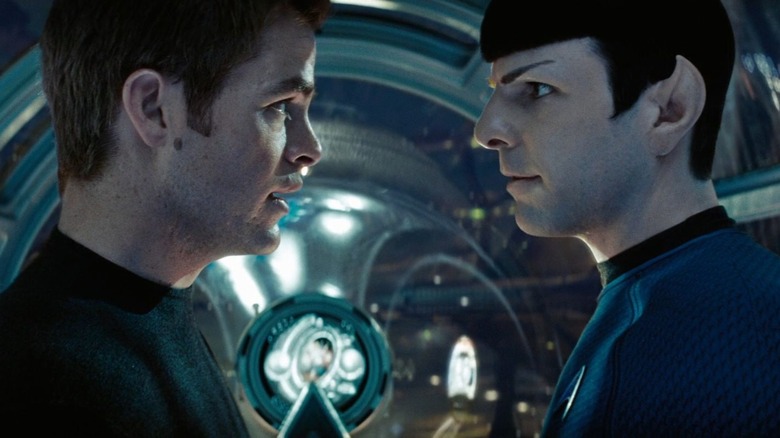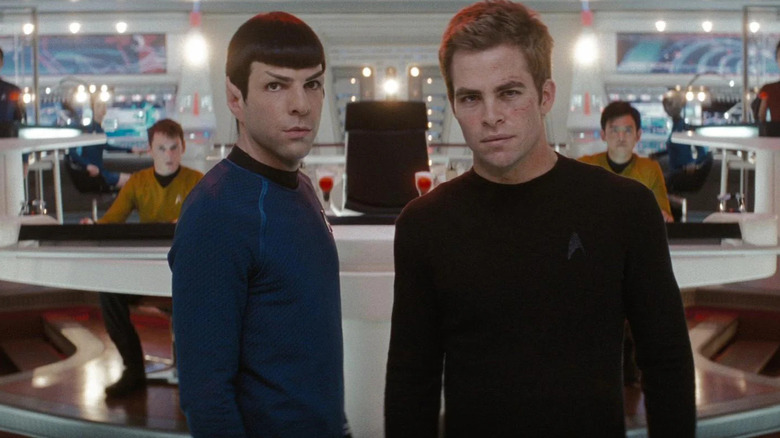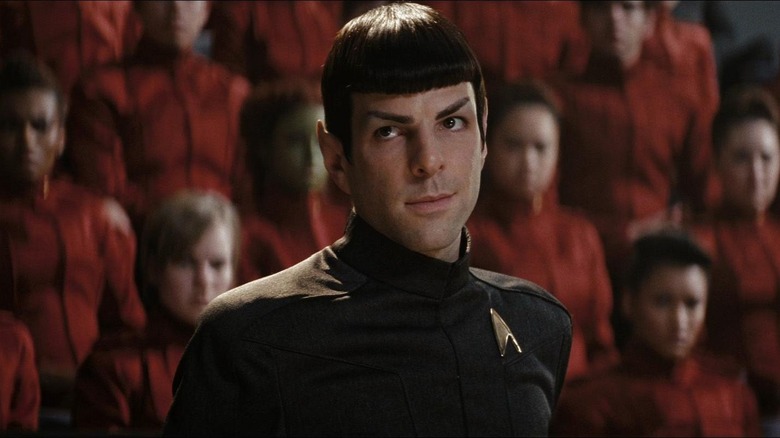The Spock And Kirk Problem J.J. Abrams' Star Trek Set Out To Solve
Modern fandom, as we have come to understand it, likely originated in the letters columns of "Amazing Stories," the sci-fi magazine first published in April of 1922. The magazine's publisher, Hugo Gernsback, founded a fan community called the Science Fiction League and encouraged the readers of "Amazing Stories" to write in and, importantly, to correspond with one another. Sci-fi fans gathered around certain works of literature and, later, movies and TV. Decades hence, when "Star Trek" went off the air, fan communities were ready to congregate like never before, and, lo, the sci-fi convention was born.
Bubbling underneath the surface of the now-exploded "Star Trek" fandom was an undercurrent of sexuality in which certain fans loved reveling. Sometime in 1970, enterprising Trekkies began writing erotic fiction starring Captain Kirk and Mr. Spock, exploring the on-screen relationship that some saw as bubbling with sexual attraction. The slang term to describe these erotic stories was "Kirk/Spock," or "K/S." K/S zines were traded surreptitiously at conventions. Eventually, the slash in between K/S came to represent the entire medium, and the term "slash fiction" was born.
This is all a long way to say that writing for Kirk and Spock has always been fraught. Each new reboot and iteration of the characters needs to carefully explore how their friendship operates. What is it in Spock that Kirk finds appealing, and vice versa? This is currently a question faced by the makers of "Star Trek: Strange New Worlds," and was talked about extensively by filmmaker J.J. Abrams when he made his 2009 "Star Trek" feature film.
In the awesome oral history book "The Fifty-Year Mission: The Next 25 Years: From The Next Generation to J. J. Abrams," edited by Mark A. Altman and Edward Gross, Abrams talked about his analysis of Kirk and Spock.
The inner Trekkie vs. the outer Star Wars fan
It was galling to Trekkies at the time, but Abrams was openly not a fan of "Star Trek." Not that a filmmaker needs to be a fan of what they're remaking, but it would have helped if he wasn't also an enormous "Star Wars" fan. What Abrams did was bring a militant, action-forward mindset to the ordinarily more cerebral "Star Trek." As such, Abrams sought to make his "Star Trek" film give young audiences the same action-packed thrill that "Star Wars" gave to him as a youth. He said:
"My whole take on it was that I needed a way in. I was challenged by and excited about giving people who had no idea of what 'Star Trek' was or had seen it and felt a little bit like I did, that it was for them and not for me. To give them a way in. To make Kirk and Spock and the other characters as relatable and as unformed or in process as possible. For example, and I've said this a lot, 'Star Wars' was, for me, a ride that was undeniable."
As such, the director said that he wanted Kirk and/or Spock to take on Luke Skywalker qualities. He felt that Luke (Mark Hamill) was relatable. According to Abrams, kids loved that character "because Luke Skywalker was you. Luke was this kid who didn't know where he was going to go, didn't know what his life was going to be. He was an average farm boy who gets this insane call to adventure." For Abrams, Kirk and Spock needed a similar Joseph Campbell-adjacent call to adventure. Hence, the odd sense of fatalism in his 2009 "Star Trek" film.
The archetypes
When constructing his versions of Kirk (Chris Pine) and Spock (Zachary Quinto), Abrams didn't draw on the many decades of extant "Star Trek" lore, but on broad, popular interpretations of the characters held in the minds of non-Trekkies. He saw Kirk as something of a reckless cowboy, which the filmmaker didn't really appreciate. Likewise with Spock, a character he felt was too cold to be fully appreciated as a universal audience avatar. Abrams said:
"Kirk was always a cocky, brilliant, shoot-from-the-hip guy who I never felt connected to. I enjoyed it. I appreciated it, but his character was objectified to me, because I just didn't connect with who that guy was. The other main guy was Spock, and he was obviously wildly logical and incredibly deliberate in his consideration, yet I never was really him. So I was disconnected from these characters, even though I could appreciate them."
Abrams' solution was to mythologize Kirk and Spock. He created younger, hotter, more impulsive versions of the characters, and pushed them through much more intense emotional struggles. He created an entire alternate "Star Trek" timeline wherein Kirk and Spock could behave more like "Star Wars" characters, and could have an impetuous and contested relationship. Spock could now feel love for Uhura (Zoe Saldana), and Kirk could be the cocky Han Solo type that Abrams clearly wanted him to be.
His approach was well-received. The 2009 "Star Trek" was the most lucrative in the series. It spawned two sequels. Whether or not Trekkies want to include the movie in official canon is a matter of fun, spirited geek debate.


